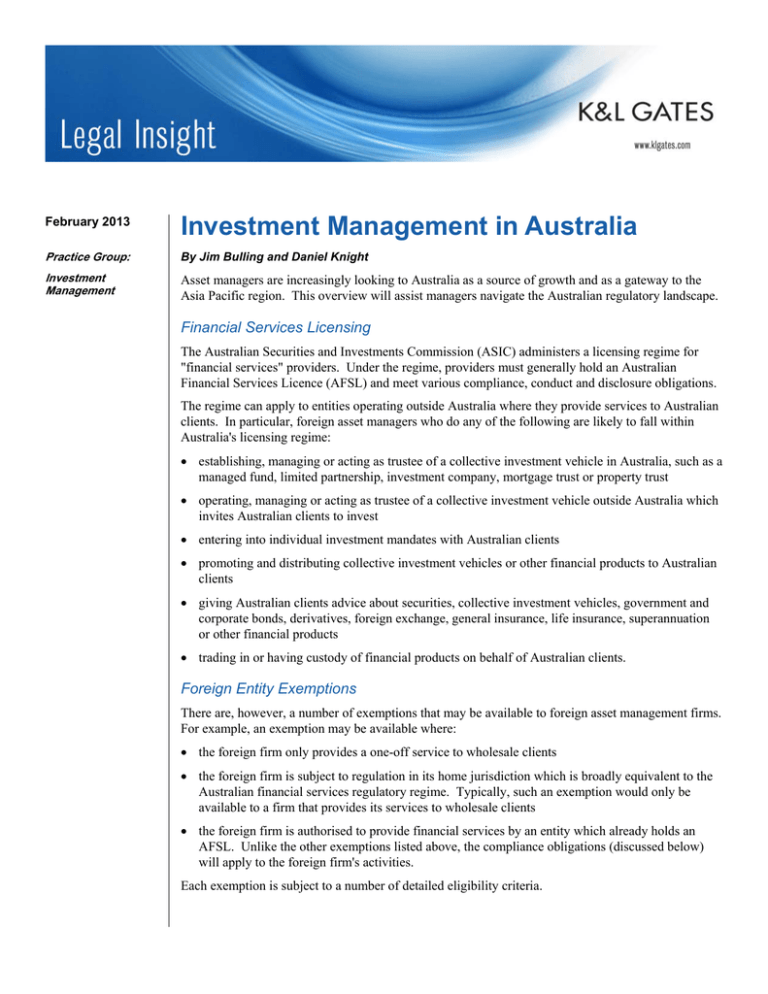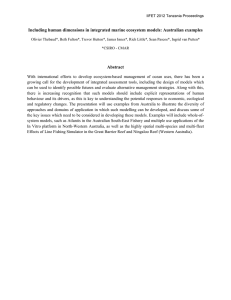
February 2013
Investment Management in Australia
Practice Group:
By Jim Bulling and Daniel Knight
Investment
Management
Asset managers are increasingly looking to Australia as a source of growth and as a gateway to the
Asia Pacific region. This overview will assist managers navigate the Australian regulatory landscape.
Financial Services Licensing
The Australian Securities and Investments Commission (ASIC) administers a licensing regime for
"financial services" providers. Under the regime, providers must generally hold an Australian
Financial Services Licence (AFSL) and meet various compliance, conduct and disclosure obligations.
The regime can apply to entities operating outside Australia where they provide services to Australian
clients. In particular, foreign asset managers who do any of the following are likely to fall within
Australia's licensing regime:
establishing, managing or acting as trustee of a collective investment vehicle in Australia, such as a
managed fund, limited partnership, investment company, mortgage trust or property trust
operating, managing or acting as trustee of a collective investment vehicle outside Australia which
invites Australian clients to invest
entering into individual investment mandates with Australian clients
promoting and distributing collective investment vehicles or other financial products to Australian
clients
giving Australian clients advice about securities, collective investment vehicles, government and
corporate bonds, derivatives, foreign exchange, general insurance, life insurance, superannuation
or other financial products
trading in or having custody of financial products on behalf of Australian clients.
Foreign Entity Exemptions
There are, however, a number of exemptions that may be available to foreign asset management firms.
For example, an exemption may be available where:
the foreign firm only provides a one-off service to wholesale clients
the foreign firm is subject to regulation in its home jurisdiction which is broadly equivalent to the
Australian financial services regulatory regime. Typically, such an exemption would only be
available to a firm that provides its services to wholesale clients
the foreign firm is authorised to provide financial services by an entity which already holds an
AFSL. Unlike the other exemptions listed above, the compliance obligations (discussed below)
will apply to the foreign firm's activities.
Each exemption is subject to a number of detailed eligibility criteria.
Investment Management in Australia
In the absence of one of the above exemptions, a foreign asset manager will need to apply to ASIC for
an AFSL. An AFSL will only be granted if ASIC is satisfied and the firm has the necessary skills,
resources and compliance arrangements.
Compliance Obligations on AFSL Holders
AFSL holders must comply with a range of compliance, conduct and disclosure obligations. These
obligations also apply to foreign entities which are exempt from the need to hold an AFSL as a result
of entering into an arrangement with an AFSL holder (as discussed above). Some of the key
obligations on these entities include:
conducting their business honestly, efficiently and fairly and having processes in place to
demonstrate that this will be the case
maintaining sufficient financial resources and human resources
holding client money on trust for clients in a separate bank account and segregating client assets
from their own assets
implementing an anti-money laundering program
keeping records of their compliance with the regulatory regime and reporting any significant
breaches to ASIC.
Where an AFSL holder provides services to retail clients, significant additional obligations apply. In
particular, an AFSL holder must:
register collective investment vehicles with ASIC and implement a range of safeguards to protect
the interests of investors
provide comprehensive disclosure documentation to prospective investors which includes certain
prescribed information, such as details of the benefits, risks, fees, terms and conditions and tax
implications of investing with the firm
provide a formal statement to the client supporting any financial product advice which considers
the client's personal circumstances
establish internal and external dispute resolution procedures
hold adequate professional indemnity insurance.
Taxation
Australia's taxation regime could well impact the way foreign financial services firms expand into
Australia and the Asia Pacific region. A detailed consideration of Australian tax issues should be
conducted prior to commencing operations here. The following observations concern some recent
developments in the Australian tax treatment of foreign managed funds with an Australian connection.
Double Tax Treaties
Australian tax is generally levied on the worldwide income of its residents and on any Australian
sourced income of non-residents. However, Australia has entered a number of double tax treaties
which modify this position. Typically, an entity that is resident in a country with which Australia has
a double tax treaty will only be subject to Australian tax in respect of income which is attributable to a
2
Investment Management in Australia
"permanent establishment" in Australia. Detailed rules govern when income will be attributable to a
permanent establishment.
Investment Manager Regime
Previously, foreign funds which appointed an Australian asset manager (and certain other service
providers) may, as a result, have been treated as having a permanent establishment in Australia and
hence be subject to Australian tax.
The Australian Government recently enacted an Investment Manager Regime to address this issue and
remove the existing tax disincentive to the use of Australian asset managers by foreign funds. This
regime exempts eligible foreign managed funds from Australian tax on income which is only taxable
in Australia because the fund engaged an Australian asset manager, agent or other service provider. In
order to be eligible for this concession, the foreign managed fund must be "widely held" and the
income must relate to "passive portfolios investments".
The Investment Manager Regime is also designed to provide clarity to US entities regarding the
historical tax treatment of certain Australian sourced income, in order to avoid a disclosure obligation
under the "United States Financial Accounting Standards Board Interpretation Number 48 Accounting
for Uncertainty in Income Taxes" (Fin 48).
FATCA
The US Government enacted the Foreign Account Tax Compliance Act (FATCA) in 2010. FATCA
will impose due diligence and reporting obligations on certain non-US financial institutions. Certain
Australian entities (such as Australian superannuation funds) are likely to be exempt from FATCA. In
addition, as with many other countries, Australia is currently considering entering into an agreement
with the US to minimize the FATCA compliance costs for Australian entities.
Authors:
Jim Bulling, Partner
jim.bulling@klgates.com
+61 3 9640 4338
Daniel Knight, Lawyer
daniel.knight@klgates.com
+61 3 9640 4324
3
Investment Management in Australia
Anchorage Austin Beijing Berlin Boston Brisbane Brussels Charleston Charlotte Chicago Dallas Doha Dubai Fort Worth Frankfurt
Harrisburg Hong Kong Houston London Los Angeles Melbourne Miami Milan Moscow Newark New York Orange County Palo Alto Paris
Perth Pittsburgh Portland Raleigh Research Triangle Park San Diego San Francisco São Paulo Seattle Seoul Shanghai Singapore Spokane
Sydney Taipei Tokyo Warsaw Washington, D.C.
K&L Gates includes lawyers practicing out of 47 fully integrated offices located in North America, Europe, Asia,
South America, Australia, and the Middle East, and represents numerous GLOBAL 500, FORTUNE 100, and
FTSE 100 corporations, in addition to growth and middle market companies, entrepreneurs, capital market
participants and public sector entities. For more information about K&L Gates or its locations and registrations, visit
www.klgates.com.
This publication is for informational purposes and does not contain or convey legal advice. The information herein should not be used or relied upon in
regard to any particular facts or circumstances without first consulting a lawyer.
©2013 K&L Gates LLP. All Rights Reserved.
4




